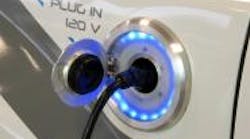“More adults claim to be knowledgeable or very knowledgeable about the causes of the global financial crisis, the difference between good and bad cholesterol and the amount of oil that has spilled into the Gulf of Mexico, than they are about the difference between various types of alternative fuel vehicles.” –From an online U.S. survey conducted this past July by Harris Interactive on behalf of Mercedes-Benz USA.
Here’s an interesting conundrum, if I’m reading these survey results right: because there are now so many different types of alternatively fueled vehicles (AFVs) now on the market, and because consumers don’t understand which type best fulfills their driving needs, they aren’t buying them.
That’s according to the results of an online poll conducted by Harris Interactive for Mercedes-Benz USA conducted from July 9-13 this year among 2,242 adults ages 18 and older.
Results were weighted as needed to reflect the composition of the U.S. adult population, Harris noted, which also stressed that its online survey is not based on a probability sample and therefore no estimate of theoretical sampling error can be calculated.
[Not every motor vehicle operator, of course, suffers from such “confusion” of course. For example, take some of the AFV developments occurring at Purdue University.]
The Mercedes/Harris poll also found that nearly one in two adults (48%) would be interested in purchasing an alternative fuel vehicle but are not sure about what type to get (e.g., hybrid, electric, diesel) and only about one in three (35%) say they know which types of AFVs are best for various driving situations (e.g., city, suburban, highway).
Other interesting findings gleaned from the Mercedes/Harris survey:
• A vast majority of U.S. adults (71%) say they are not at all or only somewhat knowledgeable about the difference between various types of alternative fuel vehicles.
• One in four adults (25%) is not at all knowledgeable about the difference between various types of alternative fuel vehicles.
• More adults claim to be knowledgeable or very knowledgeable about the causes of the global financial crisis (34%), the difference between good and bad cholesterol (45%), and the amount of oil that has spilled into the Gulf of Mexico (46%) than about the difference among various types of alternative fuel vehicles (29%).
• Men are more likely than women to say they are knowledgeable or very knowledgeable (41% vs. 18%, respectively).
• More than half of adults (58%) have never considered purchasing an alternative fuel vehicle, while nearly two in five (39%) have. Yet only 3% of those polled already own one.
Yet these survey results don’t mean AFVs face insurmountable roadblocks in the U.S., either.
Again, look at what’s happening on university campuses. Eaton Corp. has forged a partnership with the University of Notre Dame to provide electric vehicle (EV) charging stations for EVs operating within the university’s fleet.
Eaton and partner Mitsubishi Motor Company, Inc. also showcased the iMiEV (Mitsubishi Innovative Electric Vehicle) electric test vehicles, one of which the University will use in various roles in the coming months.
“This project will help us to further understand the available and growing possibilities around EV technology, as we strive to reduce our energy consumption and carbon footprint on campus,” said John Affleck-Graves, executive vice president for Notre Dame.
Through the collaboration, Eaton will install and commission with Notre Dame Pow-R-Station Level 2 EV and DC quick chargers. Campus staff, faculty and students will have access to the chargers during the demonstration test period. The charging stations, as well as an iMiEV, will be used for demonstrations on the university campus, noted Jerry Whitaker, president of Eaton’s Electrical Sector, Americas Region.
“Through our collaboration with Notre Dame, Eaton is further paving the way for the development of the infrastructure leading to the adoption and expanded use of electric vehicles,” he added.
The charging stations will be installed and maintained by the University’s utilities department in strategic locations on campus, Whitaker said.
The value of EVs and other AFVs is also growing in other ways, particularly in terms of saving fleets money while keeping more “vehicle fuel” related dollars within the U.S. Watch Erik Neandross, CEO of environmental consulting firm Gladstein, Neandross & Assoc., highlight some of those key advantages when it comes to using natural gas as a vehicle fuel.
Yet despite all of the advantages touted for AFVs – lower fuel costs, less environmental impact, and a redirection of funds into the U.S. economy – consumers remain confused over what AFV to buy and why, at least according to the findings of the Mercedes/Harris poll.
Thus, more clear and concise communication seems to be needed to help build acceptance – and purchase – of AFVs going forward.






